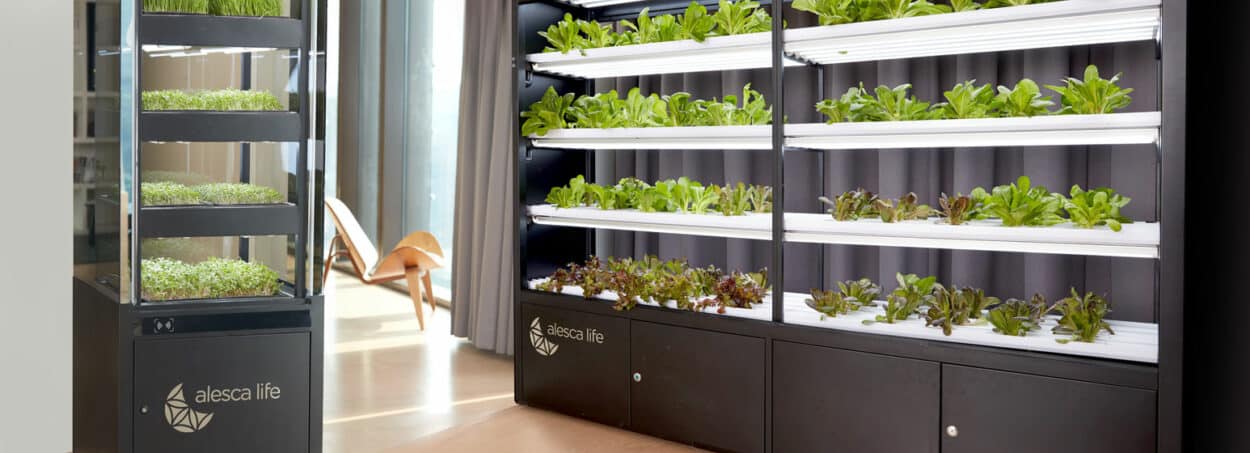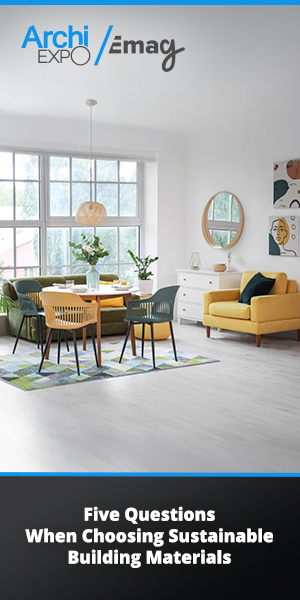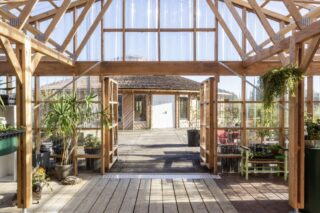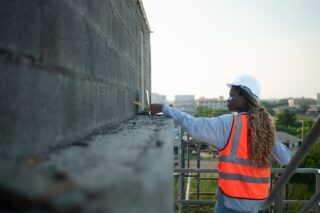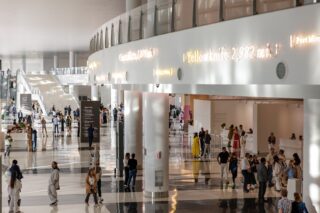During the climate change conference COP28 in Dubai, we learned more about how vertical farms present a great alternative to conventional farming and how they continue to influence the design of urban architecture.
Dubai, December 12, 2023—Amid the discussions and deliberations at COP28 in Expo City Dubai, Alesca Life, a pioneering agri-tech company with a decade-long presence in the industry, presented the imperative of localizing farming practices. The company’s participation in the climate change event aimed to shed light on the transformative potential of its technology in addressing the challenges posed by traditional agriculture methods. Invited by the UAE government, Alesca Life displayed a small farm at the event to present different farming options to the public.
The consequences of climate change have established a need for sustainable and efficient alternatives to conventional farming, especially given a closer look at the three greenhouse gases emitted from agricultural activities. Studies now show that vertical farms provide major efficiency gains, most notably by utilizing 90 to 99% less water, fertilizer, and land compared to traditional farming methods.
Over the years, vertical farming has become an essential element in the transformation of the urban landscape, most specifically when such farms have good design and proper management. In addition to shaping urban architecture, vertical farming contributes to the well-being of society which is why so many international cities are implementing the concept of vertical farming into their urban sustainable development.
Container Farms and Indoor Farming with Alesca
The Beijing-based company aims to democratize access to fresh and nutritious food by revolutionizing the means of production, as explained by Founder of Alesca Life Technologies Stuart Oda during the COP28 event. Since its foundation in 2013, the company has developed noteworthy technologies such as vertical farms equipped with patented hardware systems, operational management software, monitoring and automation devices, and computer vision AI cameras designed to optimize plant growth.
In addition to the benefits of efficiency gain, the company employs a unique process where farmers place seeds in oasis cubes for seven days before transferring them to indoor farms for a 15-day growth period. The containers are stacked vertically. Inside, the vegetables are exposed to LED lights, resulting in a sustainable and resource-efficient farming model.
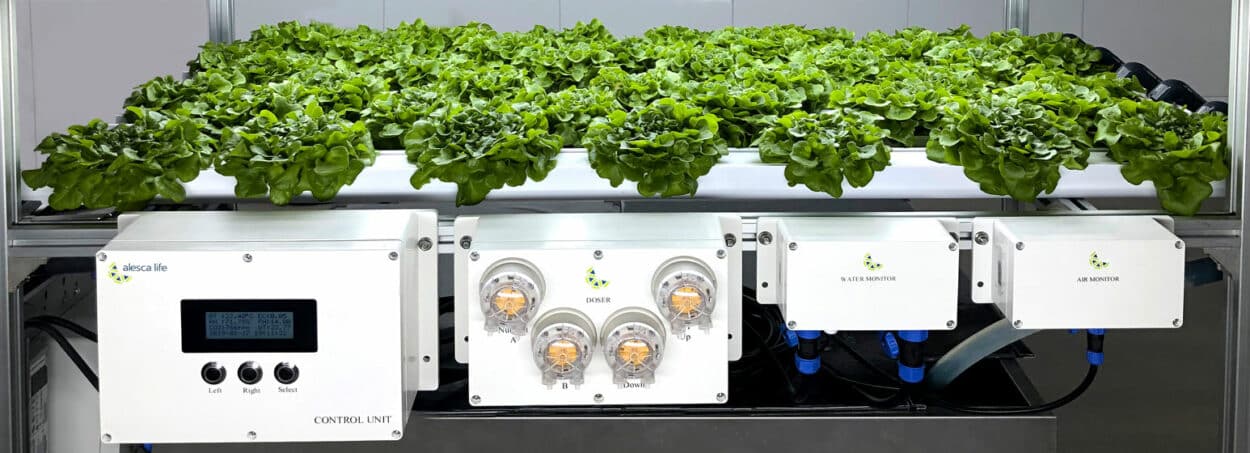

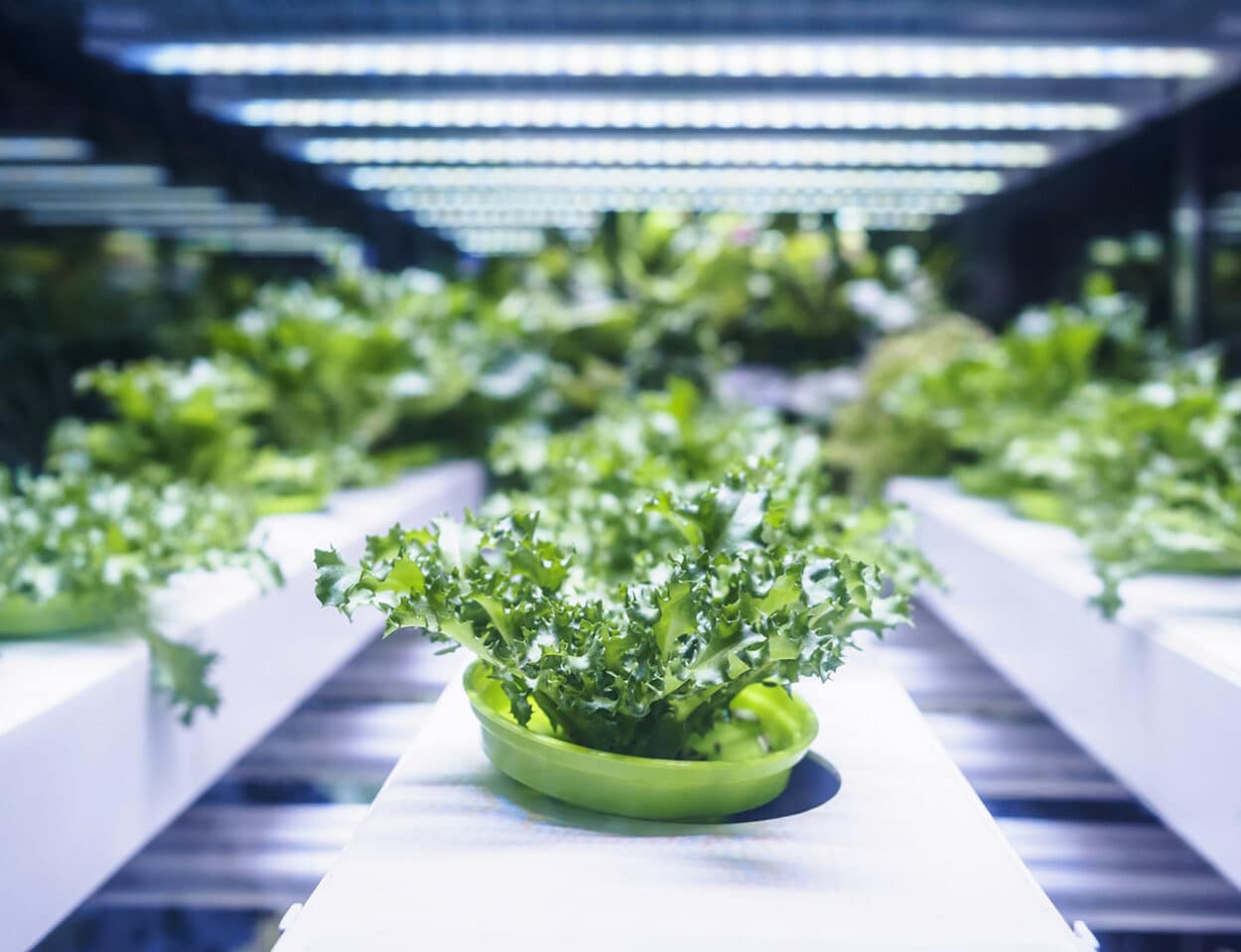
Oda led a workshop and presented on the topic of vertical farming and the future of agritech at the Expo City Farm during COP28 and also joined two panel discussions: Net Zero panel organized by Mohammed Bin Rashid Innovation Fund and Renewable Energy and Sustainable Agriculture Pavel organized by Masdar City. His presentation and both panels had a heavy focus on the integration of sustainable, local tech-driven food production and the built environment.
He expressed his vision of making food production technology accessible to everyone globally. He stressed the importance of shortening the supply chain, particularly in the face of climate change-induced disruptions that threaten the conventional food distribution system.
The urgency to address climate change’s impact on food supply chains was highlighted, with the agriculture industry being a significant contributor to greenhouse gas emissions and utilizing 70% of freshwater reserves. Alesca’s technology offers a solution to reduce carbon emissions by up to 24% through localized food production.
“The container farm is a hyper-productive and efficient vertical farm that can be built directly into a 40-foot high cube shipping container,” Oda told ArchiExpo e-Magazine in an email correspondence.
“We have refurbished second-hand shipping containers for projects in the UAE, Saudi Arabia, and Singapore and manufactured new container farms for projects in China and Japan. The container farms can produce 3,500~5,500 kilograms of fresh vegetables each year and can grow 100+ varieties of plants including microgreens, leafy greens, herbs, flowers, vine vegetables, and live fruit saplings. The HVAC system is a standard off-the-shelf commercial climate control system, so something that can be easily procured, installed, and maintained in any built environment. I’ve attached some pictures from our recent projects in the UAE.”
Alesca’s involvement in COP28 extends beyond the exhibition, as the company collaborates with developers such as Emaar in Dubai to integrate their technology into local developments. The aim is to support communities with locally grown food, fostering sustainability and resilience in the face of global challenges.
With a focus on scaling up their technology, Oda emphasized the affordability and exponential growth potential of Alesca’s solutions. The Middle East, where countries heavily rely on food imports, presents a ripe opportunity for Alesca’s technology to make a significant impact by empowering local farmers and enhancing food production efficiency.
Alesca’s innovative solutions showcased at COP28 underscore the potential for a transformative shift towards a more resilient and localized food production system.
WATCH this TedX video with Stuart Oda.
Notable Achievements
- Recognized by the World Economic Forum as a 2021 Global Innovator, 2020 SDG Champion for Zero Hunger, and 2019 Technology Pioneer.
- Lead investors include Mistletoe (Asia’s top impact fund), BitsxBites (China’s top agri/foodtech VC), and major global family offices.
- Built a 10,000m2+ specialized factory in China to mass manufacture vertical farms, industrial IoT devices, and food production capacity.
